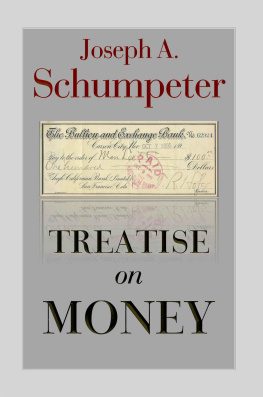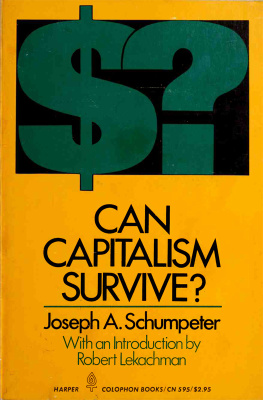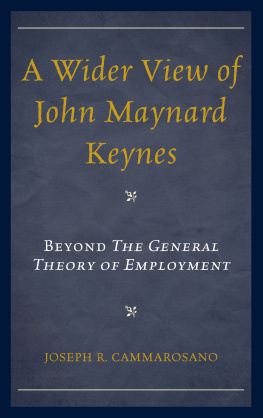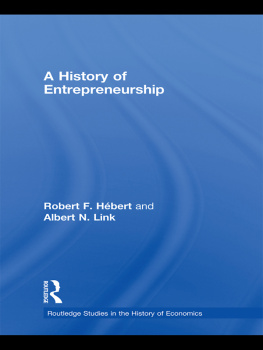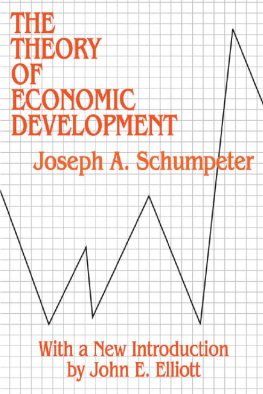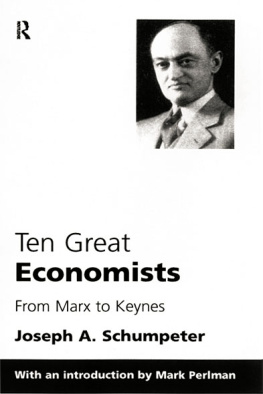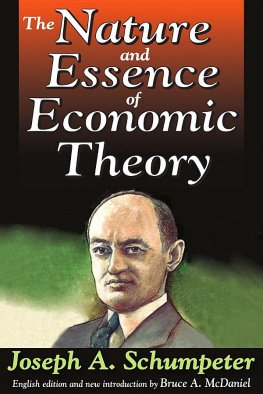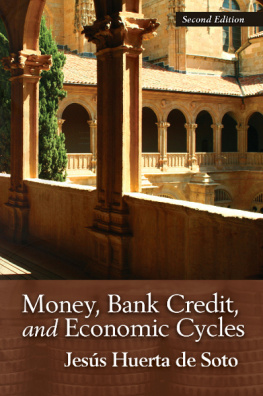Treatise on Money
Joseph Schumpeter
translated by Ruben Alvarado
WORDBRIDGE PUBLISHING
Aalten, the Netherlands
www.wordbridge.net
English translation by permission of Vandenhoeck & Ruprecht
Copyright 2014 Ruben Alvarado
German original Vandenhoeck & Ruprecht GmbH & Co. KG,
Joseph A. Schumpeter, Original title: Das Wesen des Geldes, Neuauflage, Gttingen, 2008 Cover photograph (Joseph A. Schumpeter seated on bench in forested area, photograph, ca. 1931) copyright Harvard University Archives, call number HUGBS 276.90 (p. 22)
ISBN 978-90-76660-36-3 (paperback)
Table of Contents
[xi]
Orientation
by Fritz Karl Mann
The following volume gives the light of day to a work discovered among the papers left by Joseph Schumpeter at his death. For those who interpret and continue the line of Schumpeters thought, it is an indispensable resource. Although provisionally and especially in the later chapters only fragmentarily conducted, it revised and supplemented, and melded in systematic manner, the thoughts regarding the theory of money contained in earlier writings.
I will later give an account of the genesis of this work. At this point I only make mention that the approaches taken in it go a ways back. A concise draft and research agenda are already contained in the doctrine of economic statics presented at the age of 25.
[xii] The process of ripening appears to have ended at this time. Indeed, the publication of the present book was announced by Verlag Julius Springer in 1929, at the height of Schumpeters teaching activity at the University of Bonn, bearing the title infelicitous but customary in academic lectures Geld und Whrung [Money and Currency]. This book was to be published as volume 36 of the Enzyklopdie der Rechts- und Staatswissenschaft [Encyclopedia of the Science of Law and State], in the department overseen by Arthur Spiethoff and Edgar Salin. Apparently Schumpeter had another goal beyond that, because in various statements in the manuscript he spoke of a second expected volume. I will have something to say about the vicissitudes of this plan and its ultimate failure at the conclusion of my introduction.
We will initially concentrate on the foundational character of the work, primarily the epistemological goal and the method of investigation, then the theoretical and political perspectives provided by that investigation, and, last but not least, its relation to the social-scientific system that Schumpeter envisioned.
Epistemological and methodological goals
a) In similar fashion to his studies in other areas of research, Schumpeters investigation of the phenomenon of money runs in diverse channels: on the one hand, he makes use of the tools of pure theory, concentrates thereby on quantitative relations and leaves numerous empirical facts to one side; on the other hand, he exceeds the limits customarily set by economic theory and treats the phenomenon of money in a broad historical, political, institutional, and sociological framework. Though the justification for such a methodological dichotomy might be called into question from many angles, this will not occupy us any further at this point.
I will pay just as little attention to Schumpeters numerous pleas for the right of existence of mathematical economic doctrine [mathematische Volkswirtschaftslehre]. And he belonged among the founders of the American Econometric Society, serving as its president for four years, 1937-1941.
Despite this, he by no means neglected the far-reaching social-scientific view. I only mention here an ambitious work concluded in America at the same time: his two-volume Business Cycles, the subtitle of which already ruled out that analytical restriction.
It therefore hardly surprises us that Schumpeter initially treated the phenomenon of money discussed in this book from the perspective of social science. As he puts it, Money, like any other economic institution, is an element of the overall social process and as such a matter for economic theory, for sociology, and finally for historical, ethnological, and statistical fact research. But the historical and social-scientific aspects were not, as with previous writers, relegated to secondary status.
Everything that a people desires, does, suffers, is is reflected, Schumpeter assures us, in a peoples monetary system. In his view, the ultimate data of social and political occurrences are also the deepest motivating grounds of monetary policy and the history of money: the geographical and political situation of a people, the objective and subjective opportunities provided by its economy, its social structure and political organization, its attitude toward economic matters and the future, its morale and energy, everything that is covered by the words national spirit and national character. Nothing demonstrates so clearly what a people is made of than how it conducts its monetary policy.
Even so, we dare not underestimate the inspiration he gained from Leon Walras general equilibrium analysis not even in the design of the work of monetary theory here published. But the statistical analyses derived from Walras could be coordinated with the method of historical development, as Schumpeter explicitly declared.
[xv] b) Schumpeter justified his methodological broad-mindedness, so foreign to school-bound economists, upon other grounds as well. Because these have partly been overlooked and partly misconstrued in previous writing, they will also occupy us. Some already confront us in the wide-ranging foreword of Schumpeters maiden work.
The winged words to know all is to forgive all contain good sense, began the youthful author. But even more incisively one might say to know all is to know that there is nothing to forgive. And this holds true in the sphere of knowledge as well. No method of investigation can be absolutized, he warns the reader. In this context he referred to the argument, admittedly specious, current in American pragmatic philosophy: every method of investigation is good that in its sphere of application yields useful information. From this, Schumpeter concluded that in the choice of method all a prioris must be avoided at any rate, with the proviso that one must always proceed reasonably. And even though he described himself in terms of the correlation of being a follower of both Leon Walras and Friedrich von Wieser, he rejected absolutely any methodological monomania. From a pragmatic standpoint, he criticized pure theoreticians as working too much with the concepts correct [Richtig] and wrong instead of with the concepts efficient and inefficient; for although it is every thinkers good right to get his hypotheses in order such that they in his view reflect the processes of reality, they remain creations of our caprice [Willkr]. Such interpretations miss the mark. Beyond [xvi] that, they neglect the fact that Schumpeter kept posing the question as to what from the theoretical viewpoint is efficient or useful, for which reason he often as in the present book switched between analytical tools.
Be that as it may, Schumpeters methodological lack of prejudice goes without question. It also explains other inclinations, such as his often effusive praise for the achievements of other scientists of the most diverse orientations together with self-criticism bordering on self-denial. Despite the worldwide echoes, already initiated during his lifetime by some his pupils, he wished to be considered neither a pioneer nor the head of any school. As he put it in one of his farewell speeches, to the student body of the University of Bonn, he was fundamentally far removed from any dogmatic bond. As he confessed, his scientific labor only pursued provisional knowledge, because I dont wish to say the last word. Or in a metaphor often cited since then by followers and critics, if I have a function, it is not to close doors but to open them. Never he added did he strive to bring about anything like a Schumpeter school. Such a thing does not exist and will not exist.
Next page
